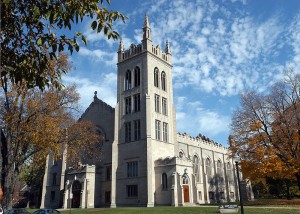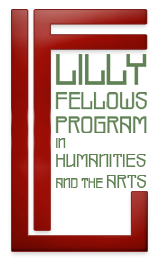 Over at Religion News Service, Eliel Cruz highlights three Christian colleges who have recently taken steps to be more inclusive of LGBT employees:
Over at Religion News Service, Eliel Cruz highlights three Christian colleges who have recently taken steps to be more inclusive of LGBT employees:
“Goshen College, Eastern Mennonite University, and Hope College have amended their policies to include employees in committed, monogamous, same-sex relationships. … These changes affect the schools’ nondiscrimination hiring policies, which now lists sexual orientation and, in the case of Goshen College and Eastern Mennonite University, gender identity, race, color, ethnicity, sex, disability, age, and other legally protected categories.”
Earlier this summer, Christianity Today reported on Belmont University doing the same, and the University of Notre Dame stating that it will comply with civil law when it comes to employment and benefits after Indiana legalized same-sex marriage.
Statements from some schools themselves indicate commitments to equality and fairness in hiring, as well as dedication to living out their mission as Christian institutions. This includes hiring people who support the values of the school. This is a perennial struggle of any college or university that tries to live out of and live into a religious identity.
 To that end, though RNS and Christianity Today don’t mention it, it is important to note that all of these schools are members of the Lilly Fellows Program National Network of church-related colleges and universities. I was a postdoctoral fellow in the LFP several years ago, and am currently serving my final year on the National Network Board. The LFP “seeks to renew and enhance the connections between Christianity and the academic vocation at church-related colleges and universities” and does so through a variety of initiatives that are all committed to helping institutions articulate and live out their individual missions.
To that end, though RNS and Christianity Today don’t mention it, it is important to note that all of these schools are members of the Lilly Fellows Program National Network of church-related colleges and universities. I was a postdoctoral fellow in the LFP several years ago, and am currently serving my final year on the National Network Board. The LFP “seeks to renew and enhance the connections between Christianity and the academic vocation at church-related colleges and universities” and does so through a variety of initiatives that are all committed to helping institutions articulate and live out their individual missions.
The network is ecumenically and politically diverse, indicated by the fact that the Christianity Today article also discusses decisions by Baylor University, Gordon College, Messiah College, Azusa Pacific University, and Westmont College to, in various ways, “affirm traditional sexual ethics.” (READ: Affirm heteropatriarchal sexuality alone.) These also are members of the Lilly Fellows Program National Network. Church-related higher education, like Christianity itself, brings together people who don’t agree on all things.
Yet all of these schools seek ways to continue living their mission in relationship to a religious identity in the contemporary context. Hope, Goshen, EMU, Belmont, and others serve as examples for those who are moving toward expanding Christian models of inclusion and justice. It is worth noting that some schools make decisions which are theologically at odds with their supporting religious bodies or denominations which continue to oppose marriage equality.
Cruz notes, “As Christian educational campuses work to keep their campus Christ-centered, they hire individuals they believe can live up to those standards. Now, they are saying that individuals in same-sex relationships and those who are transgender can live up to those standards. They are accepting them as equals – not only as coworkers but also as Christians.”
This last point matters a great deal to many people. These decisions also help to counter a dominant narrative that Christian equals anti-LGBT, which is not reality. The fact that we are talking about colleges and universities also isn’t an accident here. Again, Cruz points out that:
“In many ways, Christian campuses have always pushed the Christian LGBT conversation forward. While the majority of traditional Christian faith traditions have only discussed LGBT issues on a surface level, the Christian schools have to dive deeper. Most of these campuses have unofficial gay-straight alliances, student-run support groups for LGBT students, and have had to respond to the reality of LGBT students on campus.”
Ultimately, this is what matters for all of these institutions: Students. When colleges and universities make decisions about who they hire and who is eligible for benefits and protections, they are sending important messages to the students on their campuses.
And this is an education in and of itself.
Image via Wikimedia Commons: Hope College Dimnent Chapel, by Trenner1945.
















